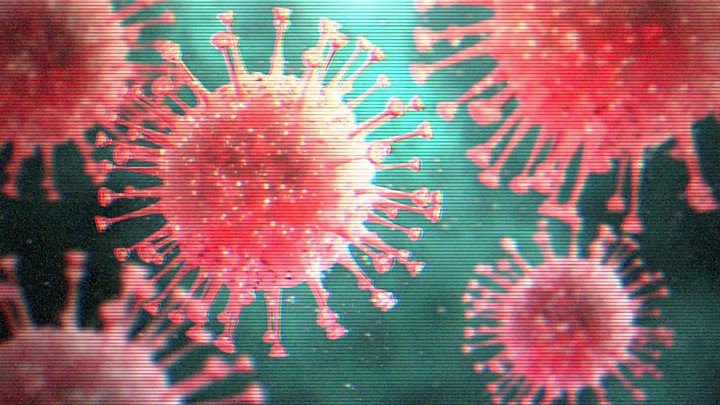
Media playback is unsupported on your device
The death toll from the coronavirus outbreak has risen to 170, and a confirmed case in Tibet means it has reached every region in mainland China.
Chinese health authorities said there were 7,711 confirmed cases in the country as of 29 January.
Infections have also spread to at least 15 other countries.
The World Health Organization (WHO) are again meeting in Geneva to consider whether the virus should be declared a global health emergency.
Various countries have implemented evacuation and quarantine plans for nationals wanting to return from China, where the outbreak began in the city of Wuhan.
Russia has decided to close its 4,300km (2,670-mile) far-eastern border with China in an attempt to stop contagion.
WHO Director-General Tedros Adhanom Ghebreyesus named Germany, Vietnam and Japan, as places where people had caught the virus from others who had visited China.
"Although the numbers outside China are still relatively small, they hold the potential for a much larger outbreak," he said, adding that human-to-human transmission was a concern.
More people have now been infected in China than during the Sars outbreak in the early 2000s, but the death toll remains far lower. Sars, also a coronavirus, caused acute respiratory illness.
Researchers are racing to develop a vaccine to protect people from the virus. One lab in California has plans for a potential vaccine to enter human trials by June or July.
What's the latest on evacuations?
Voluntary evacuations of hundreds of foreign nationals from Wuhan are under way to help people who want to leave the closed-off city and return to their countries.
The UK, Australia, South Korea, Singapore and New Zealand are expected to quarantine all evacuees for two weeks to monitor them for symptoms and avoid any contagion.
Australia plans to quarantine its evacuees on Christmas Island, 2,000km (1,200 miles) from the mainland in a detention centre that has been used to house asylum seekers.
Singapore is setting up a quarantine facility on Pulau Ubin, an island north-east of the city-state's mainland.
In other developments:
- Chicago health officials have reported the first US case of human-to-human transmission of the deadly coronavirus
- Six thousand people on board a cruise ship in Italy were barred from disembarking after a Chinese passenger was suspected of having coronavirus; however initial tests have come back as negative
- Flights to take British and South Korean citizens out of Wuhan have both been delayed after relevant permissions from the Chinese authorities did not come through
- Two flights to Japan have already landed in Tokyo. Three passengers have so far tested positive for the virus, Japanese media report
- Around 200 US citizens have been flown out of Wuhan and are being isolated at a military base in California for at least 72 hours
- Two aircraft are due to fly EU citizens home with 250 French nationals leaving on the first flight
- India has confirmed its first case of the virus - a student in the southern state of Kerala who was studying in Wuhan
How is China handling the outbreak?
Although questions have been raised about transparency, the WHO has praised China's handling of the outbreak. President Xi Jinping has vowed to defeat what he called a "devil" virus.
The central province of Hubei, where nearly all deaths have occurred, is in a state of lockdown. The province of 60 million people is home to Wuhan, the heart of the outbreak.
The city has effectively been sealed off and China has put numerous transport restrictions in place to curb the spread of the virus.
People who have been in Hubei are also being told by their employers to work from home until it is considered safe for them to return.
The virus is affecting China's economy, the world's second-largest, with a growing number of countries advising their citizens to avoid all non-essential travel to the country.
Several international airlines have stopped or scaled back their routes to China and companies like Google, Ikea, Starbucks and Tesla have closed their shops or stopped operations.
There have been reports of food shortages in some places. State media says authorities are "stepping up efforts to ensure continuous supply and stable prices".
The Chinese Football Association has announced the postponement of all games in the 2020 season.
Who has been affected?
Although there have been nearly 8,000 infections, there has been little detailed information released on the profiles of patients and how the disease affects them.
Most of the confirmed cases involve people either from Wuhan or who had close contact with someone who had been there.
A new study published by The New England Journal of Medicine on the coronavirus is based on data for the first 425 confirmed cases in Wuhan. It reveals:
- Of the 425, 55% diagnosed before 1 January were linked to the seafood and animal market believed to be at the centre of the outbreak, compared with 8.6% of the subsequent cases
- The average age was 59 years and 56% were men
- Almost half the 425 cases were adults 60 years of age or older
- Human-to-human transmission among close contacts has occurred since the middle of December
- In its early stages, the epidemic doubled in size every seven days
- 89% of the patients were not hospitalised until at least day five of illness
Learn more about the new virus

Media playback is unsupported on your device
Have you been affected by any of the issues raised? You can share your experience by emailing haveyoursay@bbc.co.uk.
Please include a contact number if you are willing to speak to a BBC journalist. You can also contact us in the following ways:
